|
Foreward: A major reason for our travel is to learn history. The city of Gdańsk, Poland gave us so much more than we asked for. The following is Audra's reaction. We'll give you an update of the day to day life in Poland in our next post. 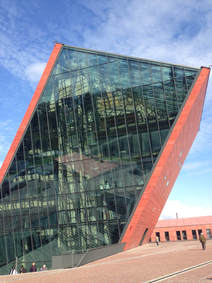 WWII Museum WWII Museum I will admit that I didn’t know what to expect when visiting the country of Poland. But, I can tell you pulling back the layers of this country has been incredible. Right now, I want to focus on the historic aspects of Poland based on our visit to the incredible Polish WWII museum. People always say that understanding history is a chance to learn and not make the mistakes from the past. I agree partially but, I’m not sure if it is physically possible to truly understand all factors at play since there are so many underlying components to world events, with so many different perspectives. World War 2 history evokes so many emotions in me – horror, pride, disgust, intrigue. But, exploring the past raises a continuous stream of questions, helps one draw comparison with modern times, forms opinions and honestly elicits a surge of gratitude. In my blog post below, you will see how these factors come into play when learning about the anguish and tenacity of the Polish people from 1939-1989. A Few of My Questions: Why didn’t the US get involved earlier? This might be obvious, but think about the sentiment of the American people at the time. The world went into WWI thinking that it would be an easy, quick war. Instead, it lasted four years and three months with men starving in trenches for months and an introduction to unprecedented weaponry. From both sides, it was a race for the most lethal arms (think machine guns, tanks, mortars) and an introduction to chemical warfare. Back home, citizens lives were turned upside down, forced enlistment and rationing--hard times. No one wanted to go to war. So in 1938, when Germany invaded Czechoslovakia (i.e. Czech Republic), Britain, Italy, and France told them this was essentially okay. “How horrible, fantastic, incredible it is that we should be digging trenches and trying on gas masks here because of a quarrel in a far-away country between people of whom we know nothing.” 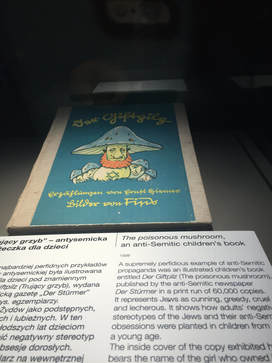 Some propaganda compared the Jews to mushrooms. "They might look like the rest of them, but they are poison and with good training you can tell them apart." Some propaganda compared the Jews to mushrooms. "They might look like the rest of them, but they are poison and with good training you can tell them apart." No one wanted to see where the horrors of war could escalate to -- perhaps annihilate whole cities (hint: foreshadowing). Who would want to go through that again? Now, I’m still curious on how much intel FDR had on the horrors of the concentration camps, but that is something else to explore in the future. Why did the Germans see what was going around them and think this was okay? Hitler drastically helped improve their economy after losing WW1, and he restored in people a renewed sense of pride for their country. The propaganda was enormous – first of a kind films, children’s books, posters. People were indoctrinated from an early age about the perfect Aryan race. Classrooms taught how the Jewish people were less superior. I mean at that age, don’t we believe the authorities? Believe our teachers? The crazy propaganda makes me appreciate the freedom of access to information. It gives the power back to the people by allowing circulation of counter-information and stimulation of discussion. I have many grievances about our current press biases, as many Americans do, but it does make you grateful for our Bill of Rights. The press (and the American people) are responsible for keeping our government in check. 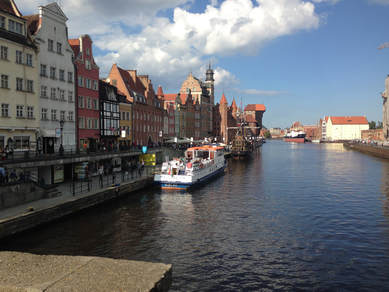 The Beautiful City of Gdańsk The Beautiful City of Gdańsk Why did the invasion of Poland start WWII? Obviously, you can’t sum it up in a few paragraphs. But, I wanted to highlight a few of the interesting things that I learned. Prior to the start of the war, there was a port city, the free city of Gdańsk, an independent organization moderated by the League of Nations. What, it wasn’t part of a country? You are correct – it was an independent city located strategically at the mouth of the river (Vistula) that runs through Warsaw and Krakow on its way to the Baltic Sea. In the early 1930s, Germany took advantage of this position by taking over a few polish-run businesses (example: the post office) by force. Eventually, they took over the whole city. So now, you have a free Poland with a German-occupied spot in the north east of their country. Nazi demands increased (i.e. free passage for trade throughout the city) and German-Polish relations rapidly deteriorated. 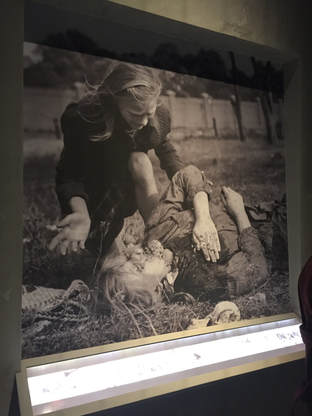 Girl grieving over mother killed in the potato fields. Girl grieving over mother killed in the potato fields. After Hitler signed a non-aggression agreement with Stalin, Germany invaded Poland in September 1939. England and France were allies with Poland and could no longer turn their heads --- so, it begins. What was the invasion like? It was a two month hard-fought battle by the Poles, but the Germans just had more firepower and technology. The museum talked about how horrific it was for the Poles to be fighting for their freedom (once again) and having to put down their arms. Hopeless. The government ended up fleeing to France and the Polish armies continued to attack at all fronts of the war throughout the upcoming decade. Stalin also saw this as opportunity to claim part of the eastern Poland region. So, he pushed his armies into the east – claiming the territory for Russia. New communist occupiers that deeply influences Poland to this very day. Hopeless. What was it like for the people? The citizens suffered so much. As the majority of Europe can attest, Hitler took all rules of war off the table. He bombed the people – innocent children, mothers and fathers. There was one American Journalist who went into Warsaw during a month long bombing streak every day to witness the siege of Warsaw. Things he witnessed: People picking potatoes even though machine gun fire was going ahead. Knowing if they didn’t – they’d starve. A maternity ward hiding newly born kids in bomb shelters. Can you imagine giving birth to someone and this was the world you brought them to? Not knowing if you could feed them. Not truly being able to protect them from anything? The Polish people became slaves, pawns in Germany’s game. Over 20,000 people died working in labor camps set up over the country. This was precisely according to Hitler's plan. The following are a few of the quotes found in the museum.
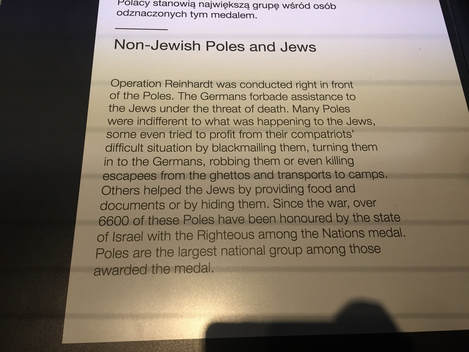 What was it like for the Jewish people in Poland? Prior to the war, the Polish people had a strong population of Jewish people. They were merchants, lawyers, doctors. They were neighbors and friends to the Poles. However unlike countries like Denmark where harboring Jews might mean a little bit of jail time, a pole would be executed immediately if caught harboring a Jew. After they were executed, their whole family would also be shot and the Jews fleeing persecution would be executed. I don’t have to go into grievances about the horrors of the holocaust – complete disregard for life. From mass executions to experimental scientific (literally, they called a group of women “rabbits” since that is how they tested), starvation and incredible brutality. One man set it right in a video we watched, ‘The Germans took away our humanity. I watched someone get beaten with blood spilling out of all orifices. I just thought – glad it is not me. I watched someone get hung for trying to escape and thought – we skipped lunch.’ It was pure human survival a crazy display of Maslow’s hierarchy in action. The Jewish population went from 3,000,000 people to 300,000 at the end of the war. That is not a typo. 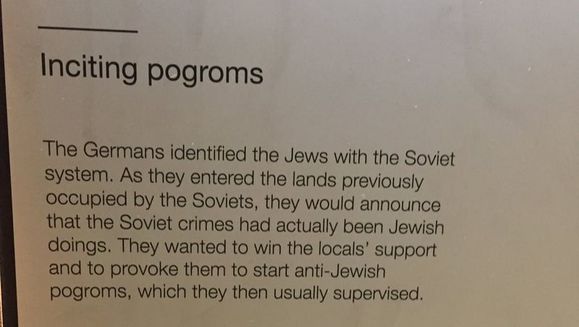 During the war, what was going on with the Soviets? Let’s talk about the Soviets. It wasn’t better in those occupied eastern lands. In fact, they had a mass murder in the city of Kniev where 20,000 people were executed by the Soviets. But for years, they blamed it on the Germans and families had no resolution! Hoping to bring opinions to their favor the Germans conquered the land and blamed it on the Jews. WTF! 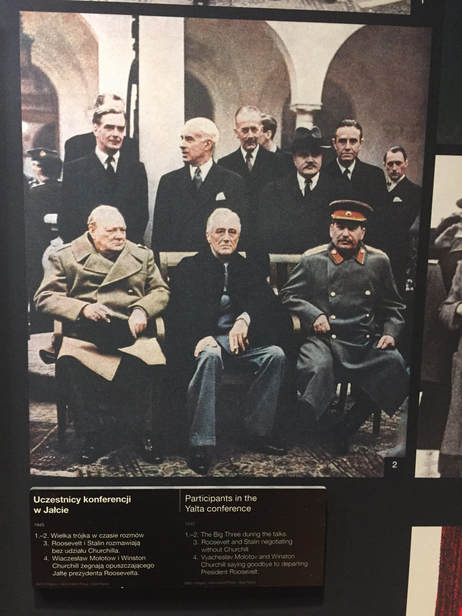 The Big Three - Churchill, Roosevelt, and Stalin The Big Three - Churchill, Roosevelt, and Stalin (If the writing style changes, it's because Kevin is the author from here on out) There were meetings between the leaders of the big three (USA, Great Britain, and Russia) to discuss what would happen to the nations in Eastern Europe after the war. Let's get one thing straight, Russia was not a good guy in WWII like you might have been taught in history. It just happened to be the lesser of two evils. You know the saying "The enemy of thy enemy is thy friend"? Yeah, that was Russia. And in order to appease them, we (Britain and USA) allowed them to place all countries east of Berlin (including part of Germany) under soviet occupation. You're welcome, Poland! You just sustained incredible losses, fought bravely, and it was decided (without your permission) that you would be behind the iron curtain. Another real cool thing (sarcasm) that the Soviets did was in regards to the Warsaw uprisings. The people of Warsaw had been occupied by the Germans for 4 or 5 years before they (The Polish Underground State) planned a rogue uprising against the Nazis. This was perfectly timed to coincide with a Russian advancement from the East. They even allowed the Russians safe passage to the capital, offering shelter and food along the way. Only that was a problem. The Soviets (at the last minute) decided to stop just short of Warsaw. Many people believe that it was a ploy by Stalin to further weaken the will of the Polish people. Thus, the Germans were able to regroup and after 63 days of fighting reoccupied Warsaw. The uprising went down as the single largest military effort taken by any European resistance movement during World War II. Somewhere around 200,000 Polish civilians and members of the civilian army died during the uprising. As a result, 85% of the city was systematically destroyed. 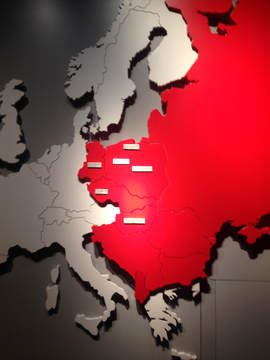 The Iron Curtain The Iron Curtain Going back in time, it really is the geographic location of Poland that leads to its sad history over the past few hundred years. In the late 1700's, it was split up by the Prussia (Germany) and Russia. In the words of our walking tour guide in Warsaw, "We became the best players in a game of hide and seek on the map of the world for 100+ years." It became 'found' on the map again after WWI, but only had 20 years or so before it was occupied for the next 50 years (again by Germans and Russians). The wall fell in 1989 and Poland entered the free world shortly after. 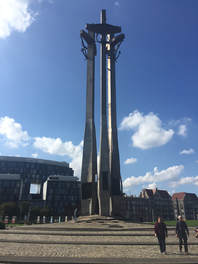 Monument to people who died during the Solidarity movement. Monument to people who died during the Solidarity movement. How did Communism end? Being under communist control was not easy. Food, housing, clothing, access to information, pretty much everything was regulated by the government. Workers had no rights. Remember Gdańsk? It was in this city that the great Solidarity movement started and the fall of Communism began. Gdańsk was home to the Lenin Shipyard, where workers started demanding the formation of Labor Unions (among other things) in 1980. A man named Lech Wałęsa (Pronounced Valensa) was the leader and voice of the movement. They protested in the form of a strike, made a specific list of demands, and eventually won. The first non-communist controlled labor union was formed, spelling the start of the demise of Communism. When the wall fell in 1989 and Poland was allowed to have its first election in 1990, Lech Wałęsa was elected president. Audra was really moved by this particular image. This was a movement that, against all odds, sparked an immediate policy change. The secret: peaceful protest, a written list of demands, and a defined leader. Our thoughts travel back home where more protests are happening surrounding issues of Police Brutality, institutional racism, and the Black Lives Matter movement. This is a movement that has a history of violent protests and has no real concise list of demands. We do believe that there is change that needs to happen in our country, but BLM should follow the lead of Lech Wałęsa and the solidarity movement if it really wants to spark change.
If you are going to know one other name that led to the fall of Communism in Poland, it should be Karol Józef Wojtyła, or more commonly, Pope John Paul II. Born and raised in Poland, he was the first non-Italian pope in 455 years. As pope, he made his first trip to communist Poland in 1979, uplifting the spirit of the (mainly catholic) Polish people. Many say that it was this visit that actually sparked the Solidarity movement. Each subsequent trip, the Pope continued to support the Anti-communist solidarity movement. Conclusion So there you have it. Polish history from WWII to 1990 (although we touched on a bit of its earlier history). As part of my Workaway stay in Kołobrzeg (pronounced Kowobzheg) we spoke with students in the local high school. One student asked us what we liked and disliked about Poland. The only real dislike is the showers, we'll touch on that one in the next post. Likes: food, people, and undoubtedly the history. We are both in awe of the grit and strength that this country and it's population had to have in order to survive, and even thrive. You might not even notice when visiting now, as they've been in the EU since 2004 and have western shopping malls everywhere. But do yourself a favor if you visit Poland: learn about their history, because it is really worth learning about.
10 Comments
Jeanice Kaiser
10/5/2017 06:41:04 pm
Thank you for your post. I always enjoy reading about what you are doing. You must feel overwhelmed with information when you visit such a place. The short portion of their history that you related makes it amazing that they have become so like other European countries. There was so much damage on their home soil. Then, again, most of Europe had so much damage everywhere. I find it amazing that there are so many old buildings that remain.
Reply
Kevin and Audra
10/17/2017 03:30:29 am
Thanks for reading Aunt Jeanie! The history and culture is so fascinating! Our brains are definitely getting a workout taking in all this information on a semi-daily basis! About the buildings: Actually in Warsaw, 85% of the buildings were destroyed, all of those are just built in the old style. Love you!
Reply
Robert
10/8/2017 11:05:03 am
Wow, I learned quite a bit of new history and love learning more about you as I read the post - look forward reading the next blog too... That part about the comparison to mushrooms is terrible -wow.
Reply
Kevin and Audra
10/17/2017 03:31:38 am
Thanks for reading! We were blown away by the Nazi propaganda section.
Reply
Mike Boschert
10/9/2017 08:46:51 am
Cool - keep the pics, stories and excitement coming.
Reply
Kevin and Audra
10/17/2017 03:32:10 am
Will do! Thanks for reading!
Reply
John Arendt
10/11/2017 06:12:49 pm
Kevin and Audra outstanding work. I have heard many stories, learned what our history books taught me, as well seen movies on WW2. What I have just read provided me with more information than everything I have ever known. God Bless the families and souls affected by such evil men. I pray we never have to see this devastation of racial genocide again in our lifetime.
Reply
Kevin and Audra
10/17/2017 03:33:31 am
Thanks for reading! I feel like we are learning so much on this trip. Travel is pretty eye and mind opening.
Reply
Joe Hertenstein
10/30/2017 02:55:07 am
Great insight. I also was moved by the history of abuse brought on to the people of Poland that I discovered with my visits to Poland. However, I admire there fortitude to continue to move forward at all obstacles. There STRONGEST attribute is family. Once you are part of there family, you are always bonded in many ways to each other which I believe is part of what help them through the darkest moments
Reply
Kevin
10/30/2017 01:04:39 pm
Thanks for reading, Uncle Joe! Couldn't agree more. Family is key here. I got the chance to hang out with 3 generations of the family I was staying with.
Reply
Leave a Reply. |
|
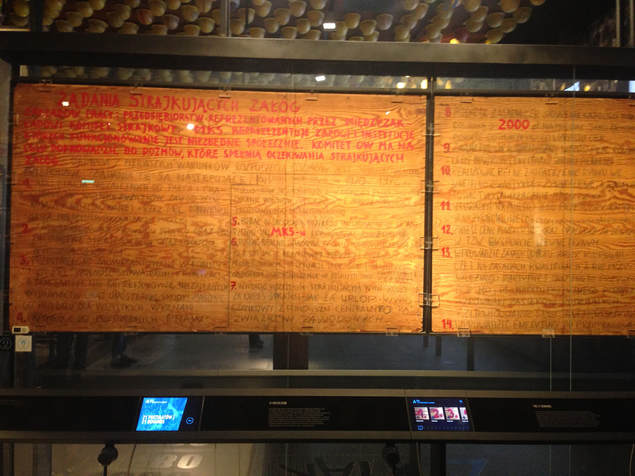
 RSS Feed
RSS Feed